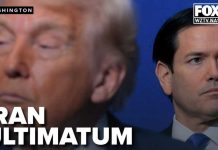
A former Justice Department employee just proved that throwing a sandwich at a federal agent can be protected political speech, not criminal assault.
Story Highlights
- Sean Charles Dunn, Air Force veteran and ex-DOJ worker, acquitted of assault for throwing sandwich at Border Patrol agent
- Grand jury refused to indict on felony charges three times before misdemeanor trial
- Incident occurred during Trump-era federal law enforcement surge targeting DC protests
- Defense successfully argued First Amendment protection for symbolic protest act
When Lunch Becomes Legal Precedent
Sean Charles Dunn walked into a federal courthouse facing criminal charges for what most people would consider a food fight. The former Justice Department employee and Air Force veteran had hurled a sandwich at a Border Patrol agent during an anti-Trump protest in Washington, DC. What happened next reveals everything wrong with prosecutorial overreach and everything right about jury common sense.
Prosecutors desperately wanted to make an example of Dunn. They tried three separate times to convince a grand jury to indict him on felony charges. Three times, ordinary citizens looked at the evidence and said no. The message was clear: throwing lunch meat doesn’t constitute a serious crime, regardless of what federal prosecutors might prefer.
The Federal Government’s Sandwich Obsession
The incident occurred during President Trump’s controversial decision to flood DC streets with federal agents from ICE and Border Patrol. These weren’t typical riot control officers; they were immigration enforcement agents suddenly tasked with crowd control duties they weren’t trained for. The heavy-handed federal presence sparked numerous protests, with activists arguing the administration was turning the nation’s capital into a police state.
Dunn’s sandwich toss became a viral symbol of resistance against what many viewed as authoritarian overreach. The Border Patrol agent who got hit reportedly laughed off the incident with colleagues, hardly the behavior of someone who felt genuinely threatened or assaulted. Yet federal prosecutors pressed forward with charges, determined to criminalize what was clearly symbolic protest.
Why Three Grand Juries Said No
Grand juries operate with a much lower burden of proof than trial juries, typically indicting when prosecutors present even minimal evidence. The fact that three separate grand juries refused to indict Dunn on felony charges speaks volumes about the weakness of the government’s case. These citizens understood what prosecutors apparently could not: the difference between a harmless protest gesture and genuine criminal assault.
The repeated grand jury rejections should have been a clear signal to prosecutors that reasonable people viewed this case as frivolous. Instead, they doubled down and pursued misdemeanor charges, wasting taxpayer resources on what amounted to a politically motivated prosecution. The eventual acquittal vindicated the grand juries’ earlier judgment and exposed the prosecutorial overreach for what it was.
First Amendment Sandwich Defense
Dunn’s defense team successfully argued that his actions constituted protected political speech under the First Amendment. This wasn’t random violence or criminal mischief; it was a calculated act of symbolic protest against federal immigration enforcement policies. The sandwich became a metaphor for rejecting the administration’s heavy-handed tactics, much like flag burning or other forms of expressive conduct the Supreme Court has protected.
The jury’s not guilty verdict represents a crucial victory for protest rights and a necessary check on government power. It sends a clear message that minor acts of civil disobedience, especially those causing no harm or injury, cannot be criminalized simply because they embarrass federal agents or challenge government authority. This principle remains essential to preserving democratic freedoms and preventing the criminalization of dissent.
Sources:
Subway sandwich thrower found not guilty in D.C. jury rebuke







